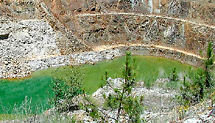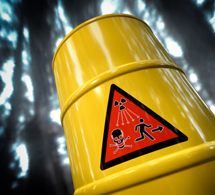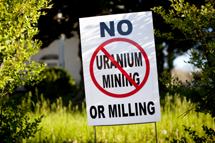A newly released study by Chmura Associates projects that "the adverse economic impact under the worst-case scenario is nearly twice as great as the corresponding positive impact in our best-case scenario."
Virginia’s Uranium Mining Moratorium
Learn about the risks associated with uranium mining in a humid climate like exists in Virginia and find out how you can help prevent the mining moratorium from being lifted.
Failed French Uranium Mining—A Model for Virginia to Emulate?
For over 20 years, proponents of a healthy Virginia have questioned whether uranium mining has been properly conducted in regions with (geologic, hydrologic, meteorological, etc.) conditions similar to those found in Virginia. Uranium mining proponents have claimed that it has been conducted properly in France.

The Mining & Milling Process
Learn how uranium is mined and milled.

The Consequences of Toxic Uranium
Uranium mining and milling produces massive amounts of toxic waste that can contaminate air, drinking water, and pristine rivers and streams. Virtually all uranium mining in the U.S. has occurred in sparsely populated regions of the arid west, where rainfall is often below 15 inches per year. Still, according to the U.S. Environmental Protection Agency, tailings have contaminated the groundwater at almost all U.S. mill sites.
Water & Uranium Mining
According to the Environmental Protection Agency's TENORM Report, "Water is perhaps the most significant means of dispersal of uranium and related [radioactive materials] in the environment from mines and mine wastes…Uranium is very soluble in acidic and alkaline waters and can be transported easily from a mine site." This is of great concern. If Virginia allows uranium mining, it would be the first state to do so in the United States in a climate where rainfall exceeds evaporation.
Radioactive Rivers
Beneath the rolling landscapes of Culpeper, Fauquier, Madison and Orange are deposits of the radioactive mineral uranium — potential mine sites. In the 1980s, companies filed mining leases on thousands of acres of land in these counties, as well as in southwest Virginia, with an interest in extracting the uranium, which can be processed into nuclear fuel.
Because uranium mining poses severe dangers to public health and the environment, PEC fought to prevent it, helping to secure a statewide moratorium on uranium mining in 1982. This ban is still in effect. But a Canadian-backed company called Virginia Uranium, Inc. is now pushing to mine a large deposit in southwest Virginia.
Virginia Uranium Company Pushing to End the Ban in 2012
On the day that an earthquake struck Virginia, as the region prepared for a hurricane, representatives of Virginia Uranium found themselves addressing the City Council of Virginia Beach, to explain why containment pits of radioactive mine tailings upstream would not pose a danger to the city’s water supply.
The timing of that meeting could have gone better for them. Still, they asserted that they’ll be able to mine uranium safely in Virginia. It’s a tall order—considering that the piles of hazardous mine wastes would cover hundreds of acres.

Uranium Here
In 1979, Bill Speiden was offered a lease for uranium mining and milling on his Orange County farm. That uranium hasn’t gone anywhere.
The debate over uranium mining and milling in Virginia is coming to a head, with a much-awaited study from the National Academy of Sciences due to be released in December. Proponents are pushing the General Assembly to end the state’s ban on uranium mining in the January 2012 session. The stakes are high; not just for southwest Virginia, but for the entire state—including the Piedmont.
